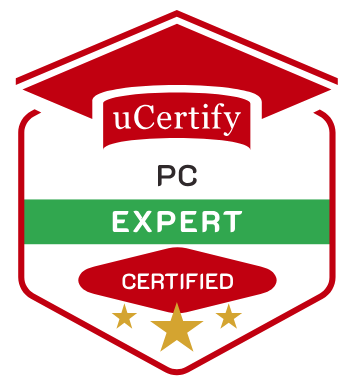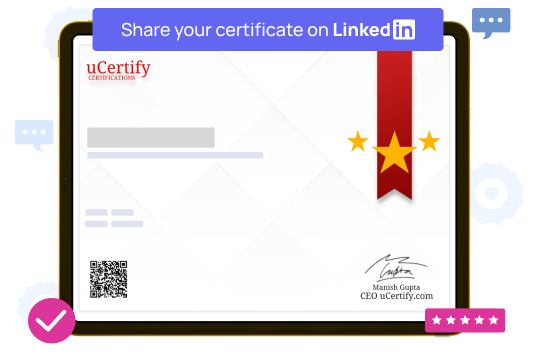PC Expert Certification
Get trained and certified for entry-level IT support roles. Secure your place in today’s digital world.


Overview
Learn the most relevant in-demand job skills with our PC Expert certification program. Grab the skills and knowledge required to troubleshoot, configure, and maintain computers, laptops, and mobile devices.
Build a high-growth career with this certification covering 9 key domains, empowering you to tackle all sorts of PC related challenges, be it hardware or software.
Why Become A uCertified PC Expert?
Learn industry-relevant skills that will give you the confidence to aim for great success in the IT industry.
Stand Out to Hiring Managers
Fulfill the basic requirements, prove your PC maintenance skills, and secure a notice-worthy first impression on your hiring managers.
Build a Case for Promotions
Whether you are an intern or a seasoned employee, you can always learn and grow. Climb the corporate ladder with the most in-demand skills.
Higher Job Security
Our PC Expert certification upscales your resume, commands a higher salary, and positions you as the best candidate for the job.
Networking Opportunities
Connect with skilled PC Expert professionals – join a network that solves problems, shares knowledge, and drives growth.



Exam Domain
1.0 Integrated Hardware Systems (15%)
2.0 Network Hosts and Tools (20%)
3.0 Network Services (9%)
4.0 Portable Connectivity Solutions (3%)
5.0 Hardware Support (6%)
6.0 Operating Systems and Applications (21%)
7.0 Securing Devices and Networks (9%)
8.0 Troubleshooting Operating Systems (5%)
9.0 Operations and Management (11%)



Exam Detail
| No. of Questions in the Exam | 75 |
| Recommended Experience | None |
| Time Limit | 150 |
| Score Range | 0-1000 |
| Passing Score | 700 |
| Exam Cost | $99.99 |
Exam Objectives
1.0 Integrated Hardware Systems (15%)
- 1.1 Define fundamental concepts of integrated hardware systems, including motherboards, processors, and memory.
- 1.2 Demonstrate the installation and configuration of expansion cards, such as graphics cards and network cards.
- 1.3 Identify various cooling solutions for CPUs and understand their functions.
- 1.4 Discuss storage technologies, such as RAID configurations, and their impact on system performance.
- 1.5 Demonstrate knowledge of installing and maintaining printers, including troubleshooting common issues.
2.0 Network Hosts and Tools (20%)
- 2.1 Define basic networking concepts such as protocols, topologies, and network models.
- 2.2 Understand the purpose and function of network hardware with cables.
- 2.3 Explain the fundamentals of the TCP/IP protocol suite.
- 2.4 Describe the components of Small Office/Home Office (SOHO) networks.
- 2.5 Understand how virtualization is used in networking environments.
- 2.6 Explore wireless networking standards.
- 2.7 Define and explain common network services such as DNS, DHCP, and FTP.
- 2.8 Understand the basic principles of cloud service models.
3.0 Network Services (9%)
- 3.1 Discuss the roles and functions of network services in a typical network infrastructure.
- 3.2 Define virtualization and its role in networking.
4.0 Portable Connectivity Solutions (3%)
- 4.1 Demonstrate knowledge of laptop and mobile device form factors and how they impact hardware design.
- 4.2 Explore various mobile connectivity technologies.
- 4.3 Troubleshoot common issues related to mobile app functionality and compatibility.
5.0 Hardware Support (6%)
- 5.1 Demonstrate the use of relevant tools and resources in the troubleshooting process.
- 5.2 Address power-related problems, including power supply issues and electrical failures.
- 5.3 Demonstrate proficiency in using diagnostic tools for storage troubleshooting.
- 5.4 Demonstrate the use of diagnostic tools to identify and resolve video and display issues.
- 5.5 Demonstrate knowledge of mobile device diagnostic tools and techniques.
- 5.6 Identify and troubleshoot common issues with printers.
- 5.7 Address problems related to network hardware, protocols, and configurations.
6.0 Operating Systems and Applications (21%)
- 6.1 Understand and manage the different types of operating systems and applications.
- 6.2 Understand the features of Microsoft Windows.
- 6.3 Manage Windows using the different tools and features.
- 6.4 Install and upgrade the Windows operating system.
- 6.5 Explore the different Windows command-line tools.
- 6.6 Configure networking.
- 6.7 Manage macOS and Linux using the different tools and features.
- 6.8 Understand the concepts of scripting and programming.
- 6.9 Understand and configure remote access using different tools and procedures.
7.0 Securing Devices and Networks (9%)
- 7.1 Understand the different types of security features.
- 7.2 Understand and deal with the different types of malware.
- 7.3 Explore the techniques to secure the organization from the different attacks, threats, and vulnerabilities.
- 7.4 Format, sanitize, and destroy hard drives.
- 7.5 Understand and manage Windows security features and settings.
- 7.6 Install and configure browsers for secured Internet browsing.
- 7.7 Configure a secured wireless network.
- 7.8 Configure a secured wired network.
- 7.9 Explore the different security features of mobile devices.
8.0 Troubleshooting Operating Systems (5%)
- 8.1 Understand and troubleshoot the different desktop OS problems.
- 8.2 Detect and remove malware.
- 8.3 Understand and troubleshoot the different mobile OS problems.
9.0 Operations and Management (11%)
- 9.1 Understand and implement safety procedures.
- 9.2 Understand and manage the environmental implications of the organization.
- 9.3 Understand the legal requirements and manage licenses and information.
- 9.4 Provide technical support to users and maintain documentation.
- 9.5 Understand and manage changes within the organization.
- 9.6 Prevent disasters and implement recovery methods.
- 9.7 Ensure proper user communication and professional interaction.
Prepare for the PC Expert Certification
Start your certification journey with these popular courses, NOW!
CompTIA A+ Core 1 (220-1101) and Core 2 (220-1102) ISBN: 978-1-64459-396-7 CompTIA 220-1101-1102.AB1
CompTIA A+ (220-1101 & 220-1102) ISBN: 978-1-64459-528-2 CompTIA 220-1101-1102.AE2
CompTIA A+ (220-1102) ISBN: 978-1-64459-532-9 CompTIA 220-1102.AE2
Complete A+ Guide to IT Hardware and Software (1201/1202) ISBN: 978-1-64459-790-3 CompTIA 220-1201-1202-SCH.AB1
CompTIA A+ Core 1 (220-1201) and Core 2 (220-1202) ISBN: 979-8-90059-002-8 CompTIA 220-1201-1202.AE1
PC Expert ISBN: 978-1-64459-557-2 uCertify PC-EXP.AA1
Acquire Specialized Computer Skills
Gain hands-on experience as a PC Expert. Learn job-relevant skills.
Computer Hardware & Peripheral Devices
Learn about Computer parts, their functions, troubleshooting techniques, and hardware installation & configuration.
Networking Essentials & Operating Systems
Explore networking concepts, protocols, installation, and configuration of Windows, macOS, and Linux operating systems.
Mobile Technologies & Printing Solutions
Understand mobile devices, their operating systems, app management, printer technologies, setup, and maintenance.
Security Measures & Troubleshooting Approaches
Learn about security threats, vulnerabilities, best practices, and troubleshooting techniques for hardware, software, and network.
Jobs You Can Apply with PC Expert Certification
Get trained to become a certified computer expert and step towards your dream job.
Become A Hardware & Software Pro
Our industry-recognized certification reinstates your credibility as a trained professional. Skill up and stay one step ahead of the competition.







